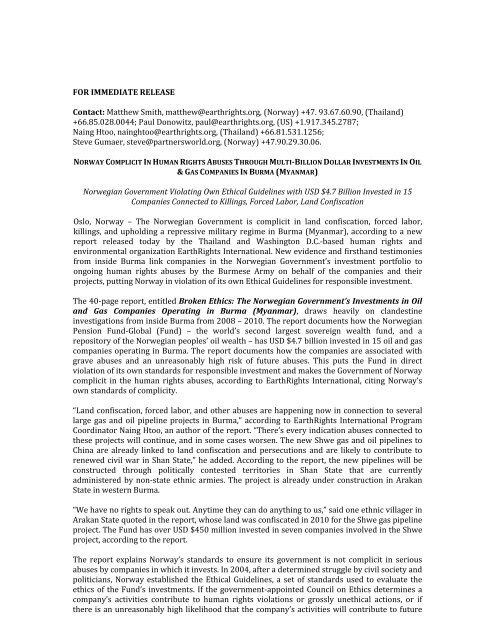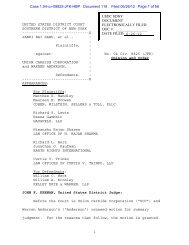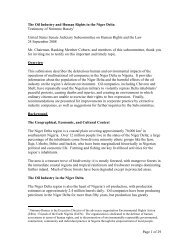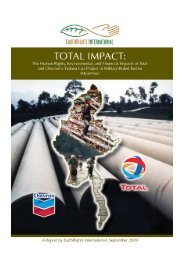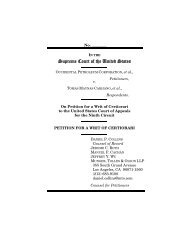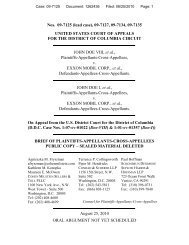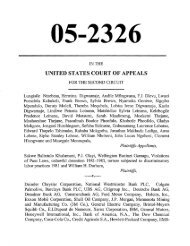Press Release - EarthRights International
Press Release - EarthRights International
Press Release - EarthRights International
You also want an ePaper? Increase the reach of your titles
YUMPU automatically turns print PDFs into web optimized ePapers that Google loves.
FOR IMMEDIATE RELEASE<br />
Contact: Matthew Smith, matthew@earthrights.org, (Norway) +47. 93.67.60.90, (Thailand)<br />
+66.85.028.0044; Paul Donowitz, paul@earthrights.org, (US) +1.917.345.2787;<br />
Naing Htoo, nainghtoo@earthrights.org, (Thailand) +66.81.531.1256;<br />
Steve Gumaer, steve@partnersworld.org, (Norway) +47.90.29.30.06.<br />
NORWAY COMPLICIT IN HUMAN RIGHTS ABUSES THROUGH MULTIBILLION DOLLAR INVESTMENTS IN OIL<br />
& GAS COMPANIES IN BURMA (MYANMAR)<br />
Norwegian Government Violating Own Ethical Guidelines with USD $4.7 Billion Invested in 15<br />
Companies Connected to Killings, Forced Labor, Land Confiscation<br />
Oslo, Norway – The Norwegian Government is complicit in land confiscation, forced labor,<br />
killings, and upholding a repressive military regime in Burma (Myanmar), according to a new<br />
report released today by the Thailand and Washington D.C.‐based human rights and<br />
environmental organization <strong>EarthRights</strong> <strong>International</strong>. New evidence and firsthand testimonies<br />
from inside Burma link companies in the Norwegian Government’s investment portfolio to<br />
ongoing human rights abuses by the Burmese Army on behalf of the companies and their<br />
projects, putting Norway in violation of its own Ethical Guidelines for responsible investment.<br />
The 40‐page report, entitled Broken Ethics: The Norwegian Government’s Investments in Oil<br />
and Gas Companies Operating in Burma (Myanmar), draws heavily on clandestine<br />
investigations from inside Burma from 2008 – 2010. The report documents how the Norwegian<br />
Pension Fund‐Global (Fund) – the world’s second largest sovereign wealth fund, and a<br />
repository of the Norwegian peoples’ oil wealth – has USD $4.7 billion invested in 15 oil and gas<br />
companies operating in Burma. The report documents how the companies are associated with<br />
grave abuses and an unreasonably high risk of future abuses. This puts the Fund in direct<br />
violation of its own standards for responsible investment and makes the Government of Norway<br />
complicit in the human rights abuses, according to <strong>EarthRights</strong> <strong>International</strong>, citing Norway’s<br />
own standards of complicity.<br />
“Land confiscation, forced labor, and other abuses are happening now in connection to several<br />
large gas and oil pipeline projects in Burma,” according to <strong>EarthRights</strong> <strong>International</strong> Program<br />
Coordinator Naing Htoo, an author of the report. “There’s every indication abuses connected to<br />
these projects will continue, and in some cases worsen. The new Shwe gas and oil pipelines to<br />
China are already linked to land confiscation and persecutions and are likely to contribute to<br />
renewed civil war in Shan State,” he added. According to the report, the new pipelines will be<br />
constructed through politically contested territories in Shan State that are currently<br />
administered by non‐state ethnic armies. The project is already under construction in Arakan<br />
State in western Burma.<br />
“We have no rights to speak out. Anytime they can do anything to us,” said one ethnic villager in<br />
Arakan State quoted in the report, whose land was confiscated in 2010 for the Shwe gas pipeline<br />
project. The Fund has over USD $450 million invested in seven companies involved in the Shwe<br />
project, according to the report.<br />
The report explains Norway’s standards to ensure its government is not complicit in serious<br />
abuses by companies in which it invests. In 2004, after a determined struggle by civil society and<br />
politicians, Norway established the Ethical Guidelines, a set of standards used to evaluate the<br />
ethics of the Fund’s investments. If the government‐appointed Council on Ethics determines a<br />
company’s activities contribute to human rights violations or grossly unethical actions, or if<br />
there is an unreasonably high likelihood that the company’s activities will contribute to future
abuses, then the Council is mandated to recommend the Ministry of Finance either observe or<br />
exclude the company from the Fund.<br />
“This report presents a distinct opportunity for Norway to do what is intended by its Ethical<br />
Guidelines,” said Matthew Smith, Senior Consultant with <strong>EarthRights</strong> <strong>International</strong> and an<br />
author of the report. “Now is the time for the Council on Ethics to recommend that the Ministry<br />
of Finance act on these companies and restore Norway to its position as a global leader in ethical<br />
investment,” he added.<br />
<strong>EarthRights</strong> <strong>International</strong> refers to Norway’s standards as “clear, appropriate, and<br />
comprehensive.” Nevertheless, the report chronicles the Council's previous assessments of the<br />
Fund's investments in companies operating in Burma, and its past failures to take effective<br />
action. The report explains that in 2005 the Council recommended against excluding from the<br />
Fund the French oil company Total, operator of the Yadana gas pipeline, on the grounds that<br />
violent abuses in connection to the company’s pipeline occurred in the past but were not<br />
continuing.<br />
<strong>EarthRights</strong> <strong>International</strong>, however, continues to document widespread forced labor and other<br />
violations by the Burmese Army on behalf of Total and its partners. In five of the last ten years,<br />
<strong>EarthRights</strong> <strong>International</strong> has documented targeted extrajudicial killings of villagers in the<br />
project area by Burmese Army battalions providing security for the Yadana pipeline, and the<br />
Yetagun pipeline that runs alongside it. The Fund has USD $3.6 billion invested in five<br />
companies involved in the Yadana and Yetagun projects.<br />
The report also explains that in a 2007 letter to the Norwegian Ministry of Finance, the Council<br />
on Ethics stated that if a company had an agreement with the Burmese authorities to construct<br />
new pipelines in Burma, that alone would be grounds for a company’s exclusion from the Fund,<br />
due to the high risk of negative human rights impacts. According to <strong>EarthRights</strong> <strong>International</strong>’s<br />
report, at least seven companies in the Fund’s portfolio are presently involved in new pipeline<br />
construction in Burma.<br />
“The Council’s inaction on the Fund’s holdings in these companies puts the Norwegian people in<br />
an inconvenient position of complicity in grave human rights abuses in Burma,” said <strong>EarthRights</strong><br />
<strong>International</strong>’s Matthew Smith. “The Norwegian peoples’ money is invested in corporate human<br />
rights abuses while the Ethical Guidelines go unapplied. The ethics are broken but not beyond<br />
fixing,” he added.<br />
“The Burmese regime has long demonstrated itself as an unsuitable business‐partner”, says<br />
Norway‐based Steve Gumaer, the co‐founder and <strong>International</strong> Executive Director of the<br />
humanitarian aid‐organization Partners Relief & Development. “Business ventures conducted<br />
through official channels in Burma directly support the regime's abuse of the ethnic populations<br />
and pro‐democracy citizens in Burma today,” Gumaer added. “It is said that villages in North‐<br />
Eastern Burma have benefitted by this sort of ‘economic engagement.’ I have seen the<br />
devastating results; instead of schools, health & hygiene programs, and other communitydevelopment<br />
projects, are the ashes of villages that have been burned down. I have talked to<br />
women who were raped, men who were forced to serve as porters. I have heard first‐hand<br />
accounts of brutal murders of anyone unwilling to go along with the regime's industrial or<br />
private business deals.” Partners Relief & Development stands with ERI in calling on the Council<br />
on Ethics to reconsider its position on companies operating in Burma’s extractive sector.<br />
<strong>EarthRights</strong> <strong>International</strong> (ERI) is a nonprofit, nongovernmental organization that combines the<br />
power of law and the power of people in defense of human rights and the environment. Focusing on<br />
earth rights, we work at the intersection of human rights and the environment. We specialize in factfinding,<br />
legal actions against perpetrators of earth rights abuses, training for grassroots and community<br />
leaders, and advocacy campaigns that seek to end earth rights abuses and promote and protect earth<br />
rights. www.earthrights.org<br />
###


